World Patient Safety Day 2023: "Engaging Patients for Patient Safety" takes center stage in Yemen
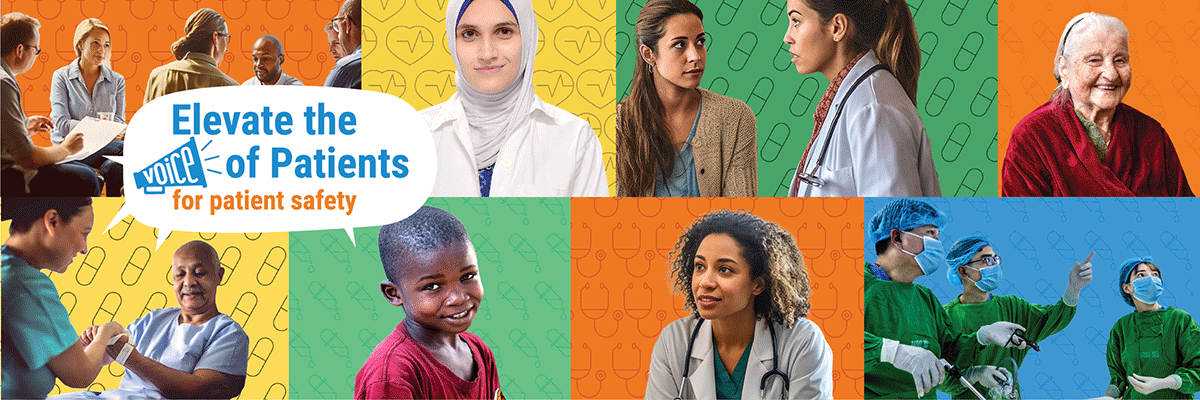
17 September 2023, Yemen — Patient safety is an intrinsic element of healthcare quality, and its significance cannot be overstated. Unsafe healthcare practices can lead to severe consequences for patients, resulting in increased morbidity and mortality rates. In low- and middle-income countries, 134 million adverse events occur each year due to unsafe care in hospitals, contributing to 2.6 million deaths annually. Globally one out of ten patients experience harm in primary and ambulatory settings, with more than 50% of this harm being preventable.
The theme for World Patient Safety Day 2023 is "Engaging Patients for Patient Safety." This theme highlights the pivotal role that patients, families, and caregivers play in ensuring healthcare safety.
In Yemen, the World Health Organization is committed to aligning with global initiatives on Patient Safety Day. This alignment will be achieved through advocacy efforts targeting policymakers, hospital overseers, and healthcare practitioners. Within the context of a weakened health system and limited access to health care services due to more than eight years of conflict, WHO aims to shed light on the detrimental consequences of unsafe care, highlight international patient safety goals, and emphasize the critical roles played by healthcare providers and patients in elevating patient safety.
"Patient safety stands as a paramount determinant of healthcare quality. Evidence demonstrates that when patients are actively involved in their care as partners, it leads to significant improvements in safety, patient satisfaction, and health outcomes. By becoming active members of the healthcare team, patients can contribute to the safety of their care and the overall healthcare system. WHO is committed to redoubling its efforts in Yemen to ensure the provision of safe healthcare, empower patients, and engage with their families and caregivers. Together, we can make a profound difference in patient safety for all Yemeni families," Dr Arturo Pesigan, WHO Representative in Yemen.
To mark World Patient Safety Day, WHO in Yemen will collaborate on the following activities:
An inaugural event will be taking place at the University of Aden’s medical college with participation from senior health officials and focal points in Yemen’s Ministry of Public Health and Population, health care workers, hospital managers, and heads of governorate health offices and district health offices. Representatives from nongovernmental organizations are also invited to participate, recognizing their important role in advancing the patient safety agenda. This event will feature interventions from quality and patient safety experts, as well as technical experts from WHO’s Yemen country office.
Hospital-Based Awareness Sessions: 14 hospitals across 14 governorates will host dedicated awareness sessions, engaging key decision-makers, hospital management, and healthcare professionals.
Distribution of Educational Material: Patient safety posters and checklists emphasizing safe childbirth and surgical protocols will be printed and disseminated across affiliated hospitals.
Join us on World Patient Safety Day as we work together to elevate patient safety in Yemen and worldwide. We believe that every second counts, and together, we can save lives through improved patient safety.
For more information:
WHO concerned over increase in measles and rubella cases among children in Yemen
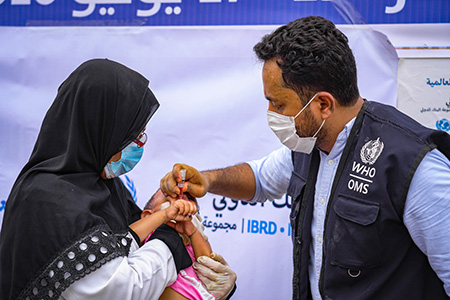 31 August 2023—The World Health Organization (WHO) is concerned over increasing cases of measles and rubella among children in Yemen. As of 31 July this year, the number of suspected cases of measles and rubella in Yemen has reached almost 34,300 cases and 413 deaths, compared to 27,000 cases and 220 associated deaths in 2022. There is also limited information on the outbreak’s impact on pregnant women who remain at high risk.
31 August 2023—The World Health Organization (WHO) is concerned over increasing cases of measles and rubella among children in Yemen. As of 31 July this year, the number of suspected cases of measles and rubella in Yemen has reached almost 34,300 cases and 413 deaths, compared to 27,000 cases and 220 associated deaths in 2022. There is also limited information on the outbreak’s impact on pregnant women who remain at high risk.
“Ideally, the outbreak response vaccination campaign should target at least all children under the age of ten to be comprehensive and effective; however, the current funding gap has eroded support and limited the target to children under five years of age—the group with higher mortality rates,” said Dr Arturo Pesigan, WHO Representative in Yemen.
The increase in measles and rubella cases among children in Yemen this year is occurring within a context of economic decline and low incomes, displacement, and overcrowded living conditions in camps, coupled with an overwhelmed health system, low immunization rates, and a large number of children who remain unreachable through routine immunization interventions. According to the WHO-UNICEF National Immunization Coverage Estimate for 2022, 27 percent of children under one year of age in Yemen are unvaccinated for measles and rubella and have not met the minimal set of vaccines for full protection.
WHO is working with the Yemeni Ministry of Public Health and Population (MoPHP) and partners to increase support for routine vaccination interventions. WHO also continues to work within the National Health Framework to provide technical and financial support to improve coverage among children. In 2022, WHO supported the protection of around 913,000 children from measles and rubella. As of July 2023, MoPHP with the support of WHO and other partners reached a coverage rate of around 65 percent of all children—both doses of measles and rubella (MR1 and MR2). A measles-rubella vaccination campaign, targeting 1.2 million children under the age of five, is planned to be implemented in September this year.
For more information visit: Yemen Health Emergency
Media contacts: WHO Yemen Communications,
Note to editors
About the Expanded Programme on Immunization (EPI) in Yemen: Yemen’s Expanded Programme on Immunization started in 1974 and aims to reduce the incidence rates of maternal and neonatal tetanus, ensure full immunization of children under one year of age, and extend all new vaccines and preventative health interventions to children in all districts, reducing the number of deaths associated with vaccine-preventable diseases.
Various childhood disease vaccines have been introduced since then, and currently, immunization against diphtheria, pertussis, tetanus, poliomyelitis, measles, pneumococcal, hepatitis B, diarrhea, pneumonia, and tuberculosis is available to every child to be protected against vaccine-preventable diseases. Similarly, a surveillance system was established to report, investigate, and respond to any outbreak related to vaccine-preventable diseases in Yemen’s Expanded Programme on Immunization.
About WHO: Since 1948, The World Health Organization (WHO) has been the United Nations agency dedicated to advancing health for all, so that everyone, everywhere can attain the highest level of health. WHO leads global efforts to expand universal health coverage, direct and coordinate the world’s responses to health emergencies and connect nations, partners and people to promote health, keep the world safe and serve the vulnerable.
The power of resilience: Yemeni families overcoming challenges against all odds
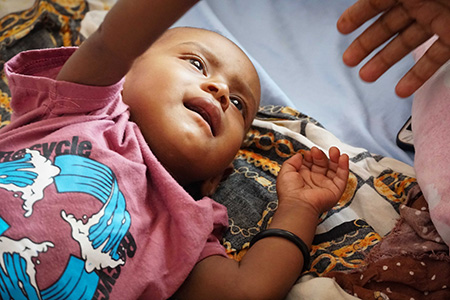 22 August 2023, Aden – Ahmed Abdel-Jabbar, a five-month-old baby, was admitted to Al-Sadaqa Hospital in Aden, Yemen yesterday, lethargic and suffering from severe diarrhea.
22 August 2023, Aden – Ahmed Abdel-Jabbar, a five-month-old baby, was admitted to Al-Sadaqa Hospital in Aden, Yemen yesterday, lethargic and suffering from severe diarrhea.
His mother, Fawzia Jamal, 30, has four children, and Ahmed is the youngest. Her husband washes cars to earn a living, but his work is not consistent. The family's income is unpredictable, and they struggle to make ends meet.
"For us, every day is a struggle. It's challenging to make plans since we never know how much money we'll have from one day to the next. We are often unable to pay our rent on time because it is a substantial burden for us. From food and clothing to medical care and education, we need so much for our kids. As a mother, I worry about it often and wish I could do more to support them,” Fawzia said.
Despite their financial difficulties, Fawzia is determined to do everything she can to keep her family healthy. When Ahmed fell ill, she brought him to Al-Sadaqa Hospital, where he received free medical care and treatment.
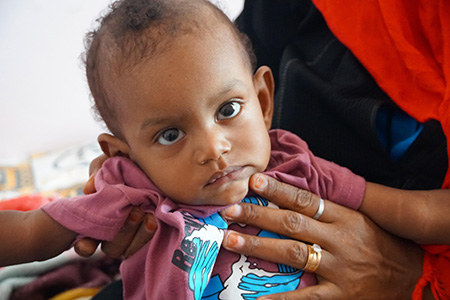 At WHO-supported Therapeutic Feeding Centres across the country, WHO is helping families afflicted by malnutrition by supplying vital health resources and support, providing a lifeline to those who are most in need. Malnourished children are provided with free nutrition and medical care, and mothers given guidance and advice on how to ensure their children are well-nourished even with minimal resources.
At WHO-supported Therapeutic Feeding Centres across the country, WHO is helping families afflicted by malnutrition by supplying vital health resources and support, providing a lifeline to those who are most in need. Malnourished children are provided with free nutrition and medical care, and mothers given guidance and advice on how to ensure their children are well-nourished even with minimal resources.
"We are committed to helping children and families impacted by malnutrition in Yemen,” said Dr. Athmar Al-Sakkaf head of the Therapeutic Feeding Centres at Al-Sadaqa Hospital. “We are members of our community, working to improve the lives of Yemeni families, and our team of skilled healthcare professionals is committed to offering life-saving treatment to millions of children like Ahmed who need our help to survive and thrive.”
Fawzia is grateful to the doctors in Al-Sadaqa Hospital for their assistance and care for her child.
"All I want is for my little Ahmed to be safe and healthy." He's so young and has already been through so much. I hope he heals quickly and returns to being the cheerful, energetic baby he always was. As a mother, it breaks my heart to see him so ill, but I am grateful for the assistance we have received here. I'm not sure what we'd do without them. I just want my baby to be okay, and I'll go to any length to ensure he has the care he needs," Fawzia said.
WHO completes consultations with Yemen health authorities for Country Cooperation Strategy 2024-2025
WHO completes consultations with Yemen health authorities for Country Cooperation Strategy 2024-2025
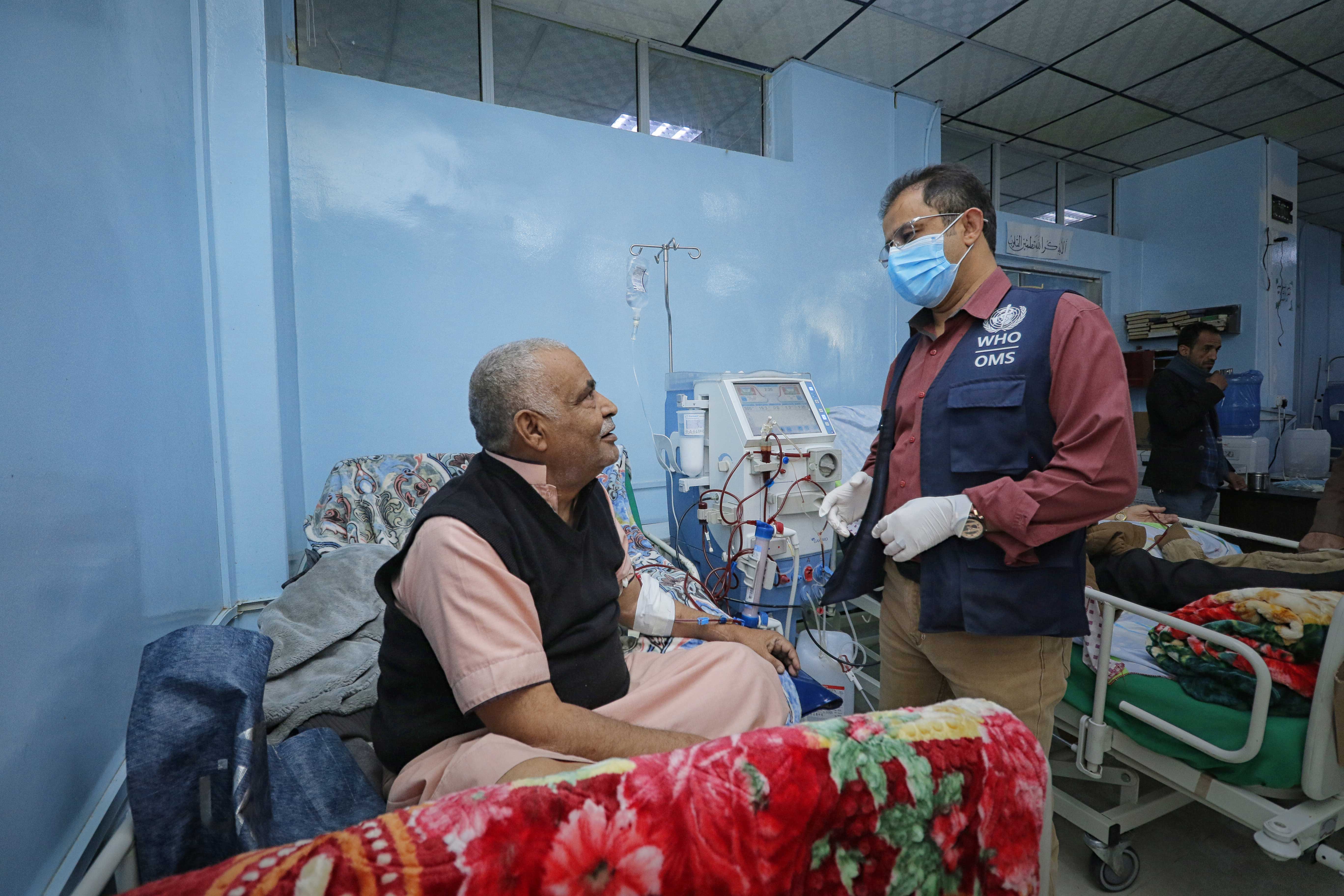 Yemen's fragile health system is heavily dependent on humanitarian aid to remain functional and provide life-saving services to millions of vulnerable Yemenis22 August 2023, Aden – The World Health Organization (WHO) has completed a series of consultations with the health authorities in Yemen with the goal of finalizing the Country Cooperation Strategy (CCS) for Yemen for 2024-2025. This important step signifies the commitment of WHO and health authorities to build on the current close collaboration to advance the health and well-being of the Yemeni people.
Yemen's fragile health system is heavily dependent on humanitarian aid to remain functional and provide life-saving services to millions of vulnerable Yemenis22 August 2023, Aden – The World Health Organization (WHO) has completed a series of consultations with the health authorities in Yemen with the goal of finalizing the Country Cooperation Strategy (CCS) for Yemen for 2024-2025. This important step signifies the commitment of WHO and health authorities to build on the current close collaboration to advance the health and well-being of the Yemeni people.
As the success of the CCS hinges upon active collaboration among WHO, health authorities, and other relevant stakeholders, further consultations are also planned by WHO in the coming weeks with donors and health partners to ensure support from all key stakeholders to foster and align synergies to advance universal health coverage and sustainable development in the health sector.
“As Yemen transitions across the humanitarian-development-peace nexus, the CCS for Yemen will serve as a strategic framework to complement national health priorities and guide the work of the health sector to apply WHO’s global health objectives at the country level. The development of the CCS for Yemen is a participatory process that involves extensive consultations with key stakeholders at the national and community levels, ensuring inclusivity and country ownership in the strategy's development,” said Dr Arturo Pesigan, WHO Representative in Yemen.
The CCS is designed to be consistent with the health-related Sustainable Development Goals (SDGs), aiming to ensure equitable access to quality healthcare for all. For Yemen, the draft CCS includes four joint strategic priorities and corresponding focus areas to guide the health agenda in Yemen over the next two years:
Provide health care to promote universal health coverage (UHC)
Protect the population by preparing for, detecting and responding to health emergencies
Promote healthier lives and well-being by addressing the determinants of health and risk factors
Promote a peace and health dividend to support resilient health systems and foster community engagement, social cohesion, partnership and collaboration
National health authorities in Yemen appreciated the consultation process, marking it as an important step for joint efforts to save lives by preventing, detecting and responding to health emergencies, promoting healthier communities and building a resilient health system.
In implementing this vision, WHO shall strive to forward evidence-based and innovative solutions that will lead to improved access to quality health services, with a focus on primary health care (PHC), leading to better health outcomes for all people in Yemen. Emphasis was also placed by national health authorities on the need to regularly review and evaluate joint health activities and maximize the use of available resources to find sustainable solutions to ensure self-reliance of the health care system.
Note to editors
The CCS is WHO’s strategic framework to guide WHO’s work in and with a Member State. It responds to that country's national health and development agenda, positions WHO’s work in Yemen in the context of the United Nations Yemen Sustainable Development Cooperation Framework (UNSDCF) 2022–2024 (UNSDCF) and WHO’s programme budget, and identifies a set of agreed joint priorities for WHO collaboration, with a focus on areas where the Organization has a role of facilitator and joint lead in UN support to accelerate implementation of the SDGs comparative advantage to assure public health impact.
In Yemen, the previous CCS expired in 2013 and has not been updated due to the prolonged conflict with subsequent humanitarian crisis. In November and December 2019, preliminary discussions between WHO and Yemen authorities aimed at developing a new CCS for Yemen started but were interrupted early 2020 due to COVID-19 pandemic. Priority was then given to developing and implementing the Yemen National COVID-19 Preparedness and Response Plan.
WHO has initiated the development process of the CCS in June 2023 and is adopting a fast-tracked approach, with the aim of launching the CCS before the end of 2023.
For more information visit: Yemen Health Emergency
Media contacts: WHO Yemen Communications,
About WHO: Since 1948, The World Health Organization (WHO) has been the United Nations agency dedicated to advancing health for all, so that everyone, everywhere can attain the highest level of health. WHO leads global efforts to expand universal health coverage, direct and coordinate the world’s responses to health emergencies and connect nations, partners and people to promote health, keep the world safe and serve the vulnerable.








